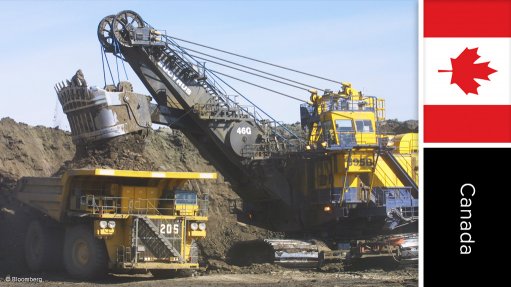
TORONTO (miningweekly.com) – Canadian exploration and mining associations, in collaboration with civil society organisations, on Thursday released recommendations for the development of a payment-transparency standard for all publicly traded mining companies in Canada.
The recommendations by the Resource Revenue Transparency Working Group were aimed at providing Canada’s federal and provincial governments, together with provincial securities commissions, with a blueprint for a payment-reporting framework. This framework would better serve the needs of the data end-users, such as citizens, governments and investors, but also those of the reporting companies.
Should government implement the recommendations, it would provide citizens around the world with valuable information about payments from companies to governments in countries that produce minerals. Increased transparency would allow citizens and media to hold their governments accountable for the revenues generated from mining activities and help to ensure that these revenues contribute to sustainable development and poverty reduction.
For example, the Africa Progress Panel suggested that Africa is home to 30% of the world’s mineral reserves, yet resource-rich African States still lag in almost all development indicators. Enhanced payment transparency is critical to ensuring that governments mobilise natural resource revenues to fight poverty and promote development.
The proposed standards provide companies with a credible means to demonstrate critical local economic contributions.
“Transparency of payments to governments will highlight the financial contributions and benefits that come from resource development,” Prospectors and Developers Association of Canada (PDAC) executive director Ross Gallinger said.
The Working Group – consisting of the Mining Association of Canada (MAC), PDAC, Publish What You Pay-Canada (PWYP-Canada), and the Revenue Watch Institute – developed and finalised the recommendations for Canada’s mining sector. These recommendations were the result of more than a year of multi-stakeholder consultations across Canada, and took into account expert guidance and a substantial public comment process.
The release of the working group’s recommendations came seven months after the Canadian government committed to enhance extractive sector payment transparency in the June 2013 run-up to the Group of Eight Summit. The document provides a roadmap for Canada to fulfil its commitment to implement mandatory payment reporting standards for Canada’s mining sector.
“In Canada, we have been able to work with industry to find common ground through a unique collaboration, which I hope provides a model for future cooperation. Canada now has the opportunity to take this common ground and create a robust payment reporting standard that will see Canada take a much stronger lead on global transparency efforts,” said PWYP-Canada director Claire Woodside.
These recommendations would require publicly traded mining companies in Canada to disclose project-level payments to domestic and foreign governments.
The working group recommended that authorities require large mining companies to disclose all payments above C$100 000, and venture issuers to disclose payments above C$10 000.
The recommendations aim to bring Canada in line with emerging global reporting standards such as those recently passed into law in the US and European Union (EU).
“The framework is consistent with existing laws in the EU and the US and moves us a big step closer to a global standard. A global standard is critical for this type of disclosure to create a level playing field for companies. It is also essential to ensure this data is consistently reported between countries for it to be truly useful to communities who wish to use it to hold their governments accountable for the responsible use of mineral revenues,” MAC president and CEO Pierre Gratton said.
Close to 60% of the world’s mining companies are listed on Canadian stock exchanges, with more than 1 000 companies operating in over 100 countries.
“We urge the federal and provincial governments in Canada to adopt these recommendations not only to bring the obvious advantages of transparency to Canada, but also because they will benefit so many poor people living in resource-rich, developing nations,” the Revenue Watch Institute president Daniel Kaufmann said.